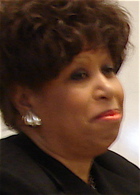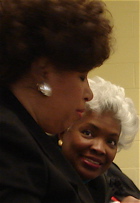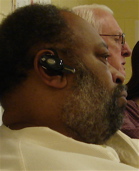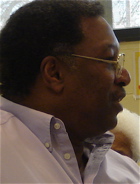
Home ●
Where We Meet ●
News ●
Announcements ●
Events ●
About Us ●
Contact Us ●
Search ●
Morning
Breakfast
Forum
Charlotte, NC
www.tueforumclt.org

Three African-American women who were 'firsts': From left, Valerie Woodard, first African-American woman elected to the Mecklenburg Board of County Commissioners; Ella Scarborough, first African-American woman elected to the Charlotte City Council; and Sarah Stevenson, first African-American woman elected to any Mecklenburg office when she was elected to the school board in 1980.
March 6, 2007
Trailblazers recall fight for respect
Their stories Tuesday were mostly from different decades, and were individual. But common threads ran through the reminiscences by three African-American women. Each was a "first " -- being the first African-American woman elected to a given public body in Mecklenburg County.
They spoke of initial struggles to be taken seriously, about constant work to reshape their community, and about how the community can continue to move forward. Excerpts by subject:
On how they decided to run for office
Sarah Stevenson: "Bishop Battle was considering running for school board in 1978.... He called and said Sarah, people are saying that they'd like you to run for the school board. If you run, I will not run. I said, no, I am not quite ready, you run. He ran in '78 and we helped him. Then they really pushed me in '80."
Presider Malachi Greene: "We're talking about an era when if more than one black person ran, then it was considered that they were running against each other, even though they were running for a seat on a school board that was not a district board at the time."
Ella Scarborough: "In 1963 in Sumter County, South Carolina, there were 310 people who made the decision that we were going to walk in the front doors of the Sumter Theater. I was one of those 310. I was too young to be in the fight. I was 11 years old. All of my mother's children were arrested. We were put in jail for two weeks. While in jail -- this was in July -- we were cattle-prodded and knocked out. From that movement, being jailed in Sumter, I went to South Carolina State. Some of you remember the Orangeburg Massacre. In 1968... we were shot at at the front lines... and dogs and water hoses were thrown on us.....
"I came to Charlotte and the Clanton Park community with Ron Leeper were... working to get just sidewalks and traffic lights on Clanton Road. I got in that fight as well, petitioned City Council and the rest is history...."
 Valerie Woodard: "I got interested in politics at a young
age... I was around my mid-20s when I got interested in the NAACP, just watching
the news, just seeing what was going on.... I had the activist spirit that I
think some of us need to have on some of these boards. I'm not easily
intimidated, although somebody probably can....
Valerie Woodard: "I got interested in politics at a young
age... I was around my mid-20s when I got interested in the NAACP, just watching
the news, just seeing what was going on.... I had the activist spirit that I
think some of us need to have on some of these boards. I'm not easily
intimidated, although somebody probably can....
"I would watch Ella, and as we said earlier Ella would make it happen. I was very proud of Ella, but did not understand how we could elect black men but couldn't elect women.... The opportunity came there for someone to run for District 3 of the county commission. Darrel Williams decided he would run at-large. The position was open. I just said to myself, why not? If not me, who? I didn't do it the way people typically do it because I didn't know how people did it, by going to the party and getting support. I went from the only knowledge I had, from the NAACP. I contend, once you've been through the NAACP, and you've run for offices in the NAACP and I had many, and won all of them, for the most part, that's a whole different group of people. And if you can deal with them ... then this group out here just might be a little easier...."
On resistance from colleagues, citizens or bureaucrats
Stevenson: "... I remember very specifically two young attorneys who came to my rescue and said, If anybody bothers you, we will defend you. And that was Lynwood Mallard and Ray Farris. After that meeting they came to every PTA Council meeting and they were there to assist me. On the school board, ... when I would ask a question, you know, nobody paid a lot of attention. Kat Crosby kept saying after the meeting, You keep asking those questions. They got to answer you sometime. But then Bishop [George Battle] would say, Sarah, they TOLD you thus and so. I said, yeah, but I didn't hear an answer -- just like they do now.... It was as if I didn't know what I was doing."
 Scarborough:
"When I was first elected... the city had $3 million for housing. And the year I
came on council it was a Republican council. And to get anything done I had to
deal with my Republican and Democratic counterparts. At that time I said I was
going to ask for $25 million in the budget for housing. Well, now, you know that
was unheard of.... One of my colleagues, when I made my pitch -- actually what I
did was I went to the Republicans and said, if you want roads, I want housing...
and what can you give me? And would you believe one of my Democrats said, you
can't get $25 million for housing. We've never put that kind of money into it.
You people always want to be special. And because of that I took that poem,
"Because of you I'm special." We got $12 million in the budget...."
Scarborough:
"When I was first elected... the city had $3 million for housing. And the year I
came on council it was a Republican council. And to get anything done I had to
deal with my Republican and Democratic counterparts. At that time I said I was
going to ask for $25 million in the budget for housing. Well, now, you know that
was unheard of.... One of my colleagues, when I made my pitch -- actually what I
did was I went to the Republicans and said, if you want roads, I want housing...
and what can you give me? And would you believe one of my Democrats said, you
can't get $25 million for housing. We've never put that kind of money into it.
You people always want to be special. And because of that I took that poem,
"Because of you I'm special." We got $12 million in the budget...."
Woodard: After election in 2002, "my colleagues... they really didn't know what to do with me. At every meeting you know you have a chair, and the chair said, oh, you look nice, you're so pretty. But all of that let me know that you aren't taking me seriously. You're not telling other folk how pretty they look....
On having to be tough:
Stevenson: "You know I don't remember a lot of that. When we had Jay Robinson as superintendent, Jay cussed all the time. Jay started me cussin'. You couldn't really get through to him. I mean, he would say 'Well Sarah dammit.' I would said 'Well Jay dammit' right back. 'You answer my question.'
"I do remember getting the school board to change how they evaluated the superintendent. When we got ready to evaluate the superintendent they brought him in and we sat and talked to him. And I said, don't you do anything with, you know, independently? Don't you do something? And they said, no, this is the way they were doing it when we got elected. And I said well I would prefer to, let's get together and we'll sit and discuss some things about the superintendent, and then we'll bring him in and evaluate him on it. And they did that.
"I got appointed to the state school boards association. They were mostly men, white men. And they would say horrible things. So I stopped that: I got up and said gentlemen, I'm not used to this kind of stuff and I'm not going to have it. And they cut that out.
"I've always tried to be a peacemaker. But you have to stay the course. You can't compromise your principles. You have to stick with what's right."
Scarborough: "If you drive down I-77 and get off on Exit 4, then turn right then make an immediate left, you will see a neighborhood that's called Choyce Avenue. During this time Choyce Avenue was a neighborhood where... Ku Klux Klan lived. And some of us remember... that when Nations Ford Road was being integrated, there was a church, it's Adams AME Church now ... they put KKK on the doors....
"One afternoon, it was just after my husband died, I got this call from a lady and she said, I need a City Council person to come to my neighborhood because we need some help. And I said where do you live, and she said Choyce Avenue. And I went, oh my God. And so I said, I will come. And at that time Shurmeier was the [police] captain of the area and I called him and said I'm going into the area and I need some officers to come with me. So anyway I went down to Choyce Avenue. And, you know, the people in Choyce Avenue wanted the same things I wanted. They wanted to be safe in their neighborhood. They didn't want to be aggravated by teen-agers who were giving them a lot of fits....
 "The
first meeting I went to two guys came up with shotguns and they were going to kill
me. Deacon, were you there when they did that?" [Deacon Jones, left, who retired as
deputy chief of police: "I think I was."]
"The
first meeting I went to two guys came up with shotguns and they were going to kill
me. Deacon, were you there when they did that?" [Deacon Jones, left, who retired as
deputy chief of police: "I think I was."]
"One guy, he said his name was.... The neighborhood was trying to tell me what they wanted. And he stood up and said, I'll give you 10 seconds to get out of this room. We don't need your kind down here.... Of course the officers came up and told him to leave. And I got up and said, listen, you asked me to come down here. You said you wanted help. Now those of you who want help, you either want ...'s idea, or you want me to come help you. And everybody from the neighborhood said, go home, we don't need you here, we want some help.
"We put water and sewer in the neighborhood. They didn't have water and sewer in that particular area of the city, if you believe this. This was 1991.... Deacon Jones and some of his guys came in and they started having a police watch of the neighborhood.... And now you go down Choyce Avenue you see brand new homes and the area is better....
"Wherever we are, the doors will close if we don't keep them open, and pull people with us. And that's what I'm looking at in America today. I'm baflled as I look at the young people who are in and are moving up, and there is no one behind them...."
On how to make change happen
 Nationally
known music educator Thomas Moore asked how to tackle the need for more
African-American role models in schoolbooks, and for more support of black
artists by the Arts & Science Council:
Nationally
known music educator Thomas Moore asked how to tackle the need for more
African-American role models in schoolbooks, and for more support of black
artists by the Arts & Science Council:
Scarborough: "Most people in this community are going to respect your opinion.... I would go to the resources you have at your fingertips.... Wherever you can get an audience. You may ask some of us to join you, but I would suggest you start now, here are the issues, call some of your friends.. I always like to work as a termite. Termites never, you never know they're working. Just when you wake up in the morning and put your hand there and [slams table] it pops through.... I suggest you work like a termite and that is go to these individuals. They love you. Oh we love you, Thomas. OK, here's some things I'm concerned about. Put it on the table. Start now. If you need to bring some of us, if some of us can help, let us know. Be glad to do it. But that's where you start."
On declining to be part of the Swann school desegregation suit
Stevenson: "I remember the Swanns tried to get me to put Sammy in the case. I would have done it but my husband said, no, he can walk up to Morgan. We ain't going to put him on no bus. Sammy was never on a school bus in his whole life because he walked to Morgan Elementary, then when we moved he walked up to Northwest. He and I had a big fight over that. He wanted to go to school with kids in back of us. They were zoned to go to Cochrane. Sammy wanted to go to Cochrane, and he said, you are such a bigshot in the PTA and you can't even get me transferred to go to school with Paul. I said, no, honey, you got to walk right up the hill to Northwest...."
On helping put together the Swann suit
Stevenson: [Plaintiff's attorney] Julius [Chambers] would call me and say I need some teachers and some principals. Would you contact some folk? I would contact certain folk. I remember getting folk together on Freedom Drive, late at night with Chambers meeting with principals and teachers who were never named, stuff like that....
"I got a lot of flak from the black community... when we were trying to integrate the schools and the PTA and all that. And I got blamed because they said you just did the wrong thing because our kids -- a lot of folks said this -- our kids are better off by themselves. And I do not agree. I did not agree that day, I do not agree today. I think we need to be together, and I think everything needs to be fair for everybody. And I'm going to still say that until I die.
"But I got a lot of flak. People said no, you forced people, putting these little black kids, sending them way out there. I was involved in practically everything, the Citizens Advisory Group that redesigned the pupil assignment plan. I could just tell you horror stories, but I'd have to go back and try to get it all together. It ain't been no Christmas fair (laughter).
On making deals
Woodard: "When I first came on the board... I noticed that most of the boards we appoint were white men. The boards were not representative of this community.... I called Bill James because I was trying to get somebody on a board, and it was important to me that we had a person of color on that board. And the person lived in Bill James' area. So in doing the statistics on how many people are voted on boards from different areas where commissioners are, he had 99.9% white men. And I said, now, Bill, you know, we might need to work something out because I need your support on this one. I need your support, and it was a black woman I was trying to get on a board. It's going to make you look mighty well, mighty good, if you would support this. Well, Bill says, Well, I'll do that if you do something for me. And I'm like, Bill, I'm not going to have people marching around my house. Whatever you want I'm not doing that. And he said, it's not that much. He wanted to send a request to Raleigh for what the state's policy was, had something to do with gays. And I figured if you're just seeking information how bad can that be? You know, I mean, I could sign off if you want some information so we ought to have it. But he didn't need my vote on that anyway. But I was able to get him to see how I needed his vote to make it happen. I didn't have all Democrats on board, and I needed a Republican and this person was in his area. And that worked. That worked. I know when I call him to ask something I know I have to be willing to give something. That's how it works...."
--------------------------------------------------------------------------------------------
The Forum welcomes all persons to its meetings
beginning at 8 a.m. most Tuesdays of the year
at the West Charlotte Recreation Center, 2222 Kendall Drive, Charlotte, NC
down the hill from West Charlotte High School.